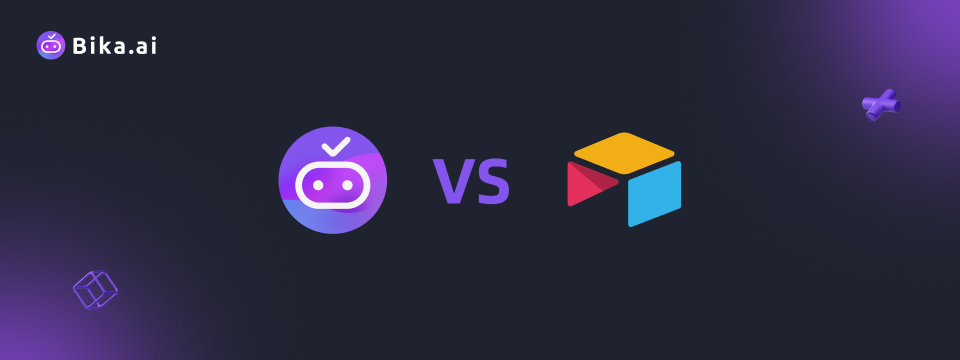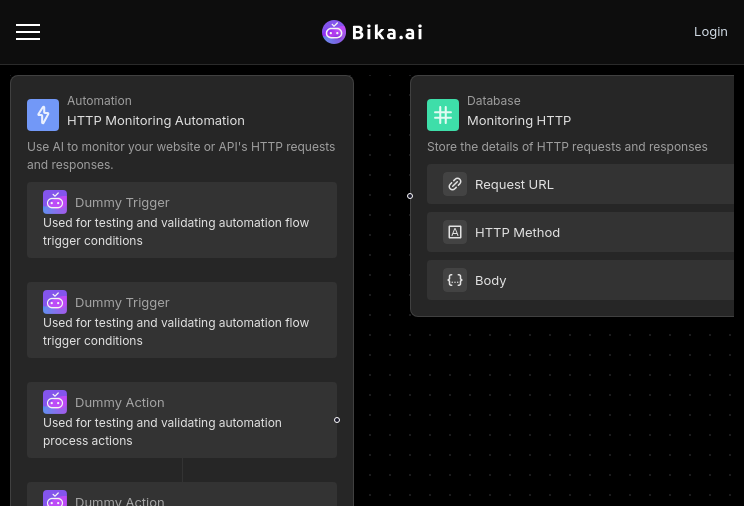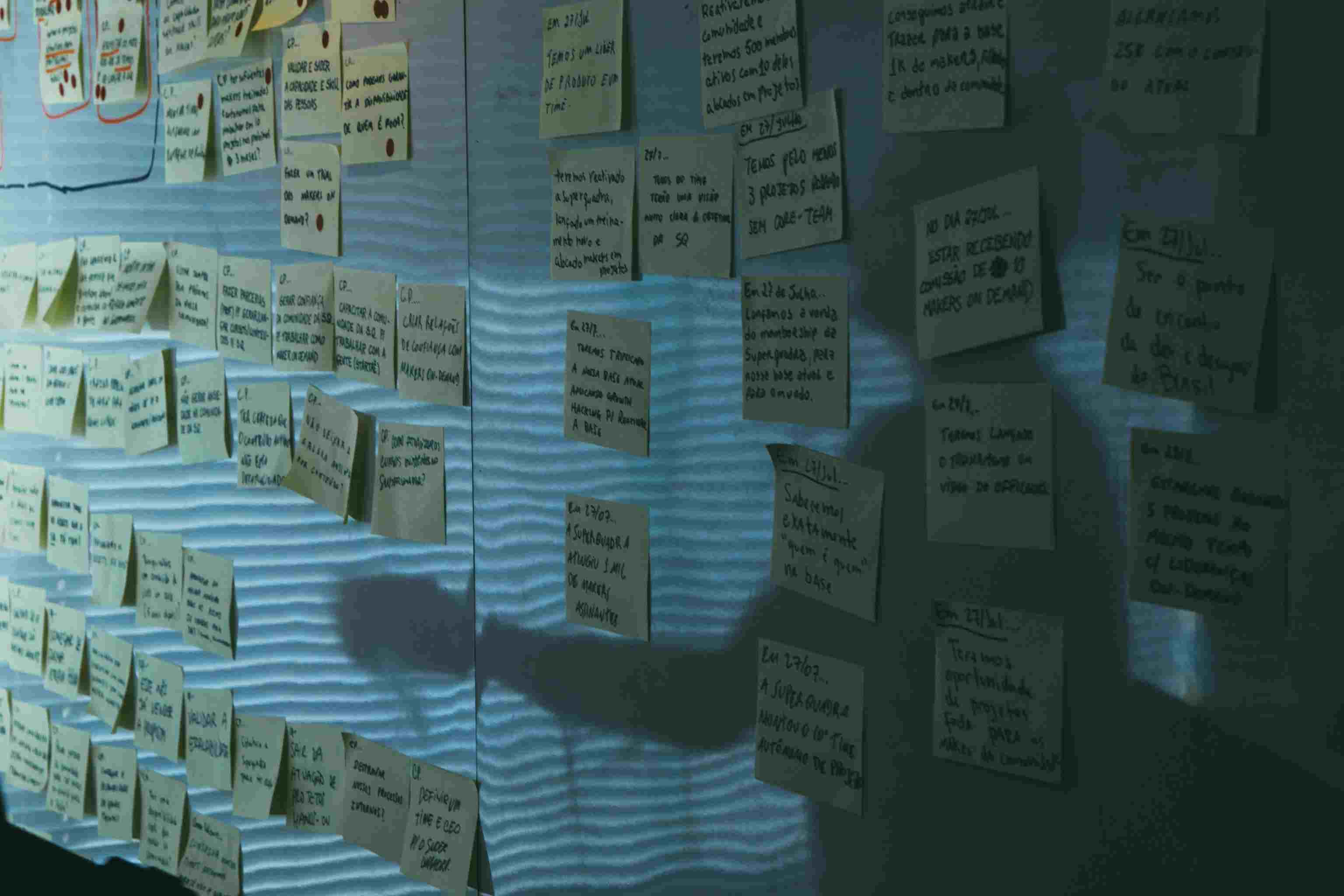
Bika.ai vs Airtable: To Real-time alerting on site downtime
What kind of challenges would require Real-time alerting on site downtime?
In today's digital age, ensuring the uptime and performance of your website is crucial. But what happens when your site goes down unexpectedly? This is where real-time alerting on site downtime becomes indispensable. Many businesses turn to tools like Airtable to address these challenges. However, a new contender, Bika.ai, has emerged with its HTTP Monitoring template, offering a competitive solution.

Airtable vs Bika.ai: Key Features At a Glance
Let's take a look at how Airtable and Bika.ai stack up against each other in terms of key features for real-time alerting on site downtime.
| Feature | Airtable | Bika.ai |
|---|---|---|
| Pricing | Free provided, paid plans from $20/user/month | Free provided, paid plans from $9.99/user/month |
| Platform Type | No-code database | No-code AI automation database |
| Ease of Use | Base structure is geeky for non-tech users | Directory tree is easy to use and user-friendly for general users |
| Records per Database | Up to 125,000 records per base for Business plan | Up to 1,500,000 records per database for Team plan |
| Automation | Basic automation capabilities with limited triggers and actions | Advanced automation capabilities with extensive triggers and actions |
| Template | Templates don’t include automation capability; no automation publish and share | plenty of plug-and-play AI automated templates with preset content; supports automation publish and share |
| Storage | 100 GB of attachments per base | 800 GB per space |
| API | Limited APIs | API-first platform making every feature an integration endpoint for automation |
Bika.ai's Advantage Over Airtable
Bika.ai stands out from Airtable in several significant ways when it comes to real-time alerting on site downtime.
Intuitive UI Layout
Airtable's UI, centered around the concept of "bases," can be complex and overwhelming for non-tech users. In contrast, Bika.ai's directory tree layout is straightforward and user-friendly, making data management and navigation a breeze.
Handling Large Data Volumes
While Airtable's Business plan only supports up to 125,000 records per base, Bika.ai's Team plan can handle up to 1,500,000 records per database. This makes Bika.ai a better choice for businesses dealing with extensive data.
Advanced Automation
Airtable offers basic automation tools that require manual setup and monitoring. Bika.ai, on the other hand, is driven by AI, proactively managing workflows and data analysis with minimal user input.
Plug-and-Play Templates
Airtable's templates lack automation capabilities and sharing options. Bika.ai provides a range of templates with built-in automation and the ability to publish and share, facilitating rapid workflow implementation.

Bika.ai's Research and Adaptation for Real-time Alerting
Bika.ai has conducted in-depth research and gathered practical feedback on the real-time alerting on site downtime scenario. By understanding the specific needs of users, Bika.ai has tailored its solutions to the relevant audience and market. This adaptation helps businesses improve efficiency and save valuable time.
The Value of Real-time Alerting Automation for Team Collaboration
Real-time alerting on site downtime automation brings numerous benefits to team collaboration. It leads to increased efficiency, saves time, reduces errors, allows for customization, offers convenience, and cuts costs. Professionals such as DevOps engineers, QA engineers, web developers, data analysts, and operations engineers can all benefit from this. Moreover, the HTTP Monitoring template has wide application scenarios, including but not limited to real-time alerting on site downtime.

How to Use Bika.ai's HTTP Monitoring Template
To take advantage of Bika.ai's HTTP Monitoring template, follow these steps:
- Install the Template Install the HTTP Monitoring Template through the platform. Once installation is complete, you will receive a success message and guidance for the next steps.
- Enter URL Address Before using HTTP monitoring, you need to enter your URL address. Click the prompt button and follow the instructions to complete the entry.
- Configure Monitoring
- Set the monitoring frequency, for example, check HTTP status every minute.
- Configure trigger conditions and actions, such as logging detailed information about HTTP requests and responses.
- View Reports
- View the automatically generated reports and performance analyses to understand the operational status and potential issues of your website or API.
How to Switch From Airtable to Bika.ai
Switching from Airtable to Bika.ai is a straightforward process:
- Export your data from Airtable in a CSV or Excel format.
- Sign up for Bika.ai and use its data import tools to transfer your data.
- Set up your automation templates in Bika.ai to start enjoying the benefits of AI automation immediately.
It's time to embrace the power of Bika.ai and revolutionize your real-time alerting on site downtime solutions!

Recommend Reading
- Airtable Pricing vs. Bika.ai Pricing: Which is More Advantageous for Project Manager?
- Data Automation with Bika.ai: Unlocking New Potential for Automated Stock Data Retrieval (Python) in Regulatory compliance
- The Ultimate Solution for Facebook Posting: Bika.ai's Automation Template
- Weekly meeting reminder (WeCom): Airtable Alternative to Emergency response drill
- Airtable Pricing vs. Bika.ai Pricing: Which is More Advantageous for Track content performance?
Recommend AI Automation Templates





